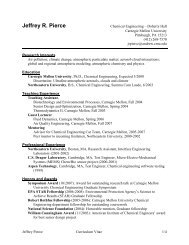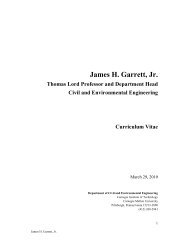1996 Electronics Industry Environmental Roadmap - Civil and ...
1996 Electronics Industry Environmental Roadmap - Civil and ...
1996 Electronics Industry Environmental Roadmap - Civil and ...
Create successful ePaper yourself
Turn your PDF publications into a flip-book with our unique Google optimized e-Paper software.
Appendix J<br />
Appendix J. European Disposition Initiatives<br />
This appendix discusses several initiatives to develop an infrastructure for the collection <strong>and</strong> processing<br />
of post-consumer electronics, focusing on public <strong>and</strong> consortial systems. Models from<br />
five Northern European countries are presented, including Austria, Switzerl<strong>and</strong>, France,<br />
Germany, <strong>and</strong> the Netherl<strong>and</strong>s. Based on several years of discussions <strong>and</strong> experience, these<br />
models represent industry’s ideas on how to best manage the recycling of post-consumer goods<br />
given the constraints imposed by government. Whether “voluntary” or m<strong>and</strong>ated, each of these<br />
models was spawned as a result of legislative activity, or in an effort to preempt m<strong>and</strong>ates.<br />
Collection systems that are fully operational (Austria <strong>and</strong> Switzerl<strong>and</strong>) will be discussed first,<br />
followed by the proposals of the French, German, <strong>and</strong> Dutch electronics industries.<br />
Austria: A Reserve Distribution Model<br />
Austrian producers <strong>and</strong> importers established a country-wide recycling network for refrigerators,<br />
freezers, <strong>and</strong> air conditioners in response to a 1993 directive from the Austrian Environment<br />
Ministry. Managed by the Umweltforum Haushalt on behalf of 40 producers <strong>and</strong> importers, the<br />
system principally operates through a series of competitive partnerships among retail<br />
establishments, transportation firms, <strong>and</strong> recyclers. Additionally, in some regions of Austria—<br />
including Vienna, which accounts for almost 25% of Austria’s population—the local authorities<br />
participate in the private system.<br />
Customers return old refrigerators or freezers to retail establishments when they purchase a new<br />
unit, or to participating local authorities. Under contract with Umweltforum Haushalt,<br />
transportation firms privately negotiate with retail establishments for the collection of used<br />
equipment. The transportation firms in turn negotiate agreements with recycling firms.<br />
Competition between the nine transportation partners <strong>and</strong> the recycling firms ensures competitive<br />
prices.<br />
In the Austrian scheme, consumers pay a fee of 100 schillings (approximately U.S. $10) at the<br />
time of product purchase, as a “down payment” for collection <strong>and</strong> recycling at the end of product<br />
life. As proof of payment, the customer receives a prepaid coupon that is affixed to the unit. At<br />
the end of life, the consumer returns the equipment to a retail establishment at which time he/she<br />
must pay a disposal fee equivalent to the current market price for recycling minus the down<br />
payment of 100 schillings. Five percent of the total recycling costs (down payment plus disposal<br />
fee) are turned over to Umweltforum Haushalt for administrative costs (currently 25 schillings, or<br />
U.S. $2.50 per unit). Total recycling costs are capped at 500 schillings/unit, which includes 10%<br />
sales tax.<br />
Although under contact to Umweltforum Haushalt, transport <strong>and</strong> recycling firms are free to negotiate<br />
recycling rates with retail establishments. For example, lower recycling fees may be negotiated<br />
for higher volume retail outlets, similar to new product sales. Depending on the region of<br />
Austria, recycling a refrigerator or freezer currently costs 400 to 450 schillings, or U.S. $40 to<br />
$45. Recycling costs have dropped over 40% in 2 years as a result of both increased competition<br />
<strong>and</strong> experience. In fact, two months after switching from a monopoly with fixed prices to a competitive<br />
system, recycling fees plummeted 28%.<br />
251






